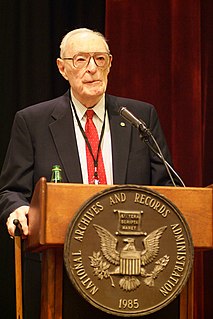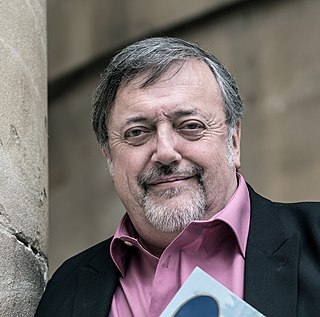A Quote by Michael Pollan
For though we may be the Earth's gardeners, we are also its weeds. And we won't get anywhere until we come to terms with this crucial ambiguity about our role - that we are at once the problem and the only possible solution to the problem.
Related Quotes
Just like Pharaoh couldn't get a solution to his problem until he talked to Moses, or Nebuchadnezzar or Belshazzar couldn't get a solution to his problem until he talked to Daniel, the white man in America today will never understand the race problem or come anywhere near getting a solution to the race problem until he talks to The Honorable Elijah Muhammad.
I think that there is only one way to science - or to philosophy, for that matter: to meet a problem, to see its beauty and fall in love with it; to get married to it and to live with it happily, till death do ye part - unless you should meet another and even more fascinating problem or unless, indeed, you should obtain a solution. But even if you do obtain a solution, you may then discover, to your delight, the existence of a whole family of enchanting, though perhaps difficult, problem children, for whose welfare you may work, with a purpose, to the end of your days.
I see the war problem as an economic problem, a business problem, a cultural problem, an educational problem - everything but a military problem. There's no military solution. There is a business solution - and the sooner we can provide jobs, not with our money, but the United States has to provide the framework.
For the problem of decision-making in our complicated world is not how to get the problem simple enough so that we can all understand it; the problem is how to get our thinking about the problem as complex as humanly possible--and thus approach (we can never match) the complexity of the real world around us.
There is a very common, though also very silly, picture of Kant according to which as empirical beings we are not free at all, and we are free only as noumenal jellyfish floating about in an intelligible sea above the heavens, outside any context in which our supposedly "free" choices could have any conceivable human meaning or significance. Part of the problem here is that Kant faces up honestly to the fact that how freedom is possible is a deep philosophical problem to which there is no solution we can rationally comprehend.
The solution to a problem - a story that you are unable to finish - is the problem. It isn't as if the problem is one thing and the solution something else. The problem, properly understood = the solution. Instead of trying to hide or efface what limits the story, capitalize on that very limitation. State it, rail against it.
No matter how clear things might become in the forest of story, there was never a clear-cut solution, as there was in math. The role of a story was, in the broadest terms, to transpose a problem into another form. Depending on the nature and the direction of the problem, a solution might be suggested in the narrative. Tengo would return to the real world with that solution in hand. It was like a piece of paper bearing the indecipherable text of a magic spell. It served no immediate practical purpose, but it contained a possibility.
When you start looking at a problem and it seems really simple, you don't really understand the complexity of the problem. Then you get into the problem, and you see that it's really complicated, and you come up with all these convoluted solutions. That's sort of the middle, and that's where most people stop... But the really great person will keep on going and find the key, the underlying principle of the problem - and come up with an elegant, really beautiful solution that works.




































